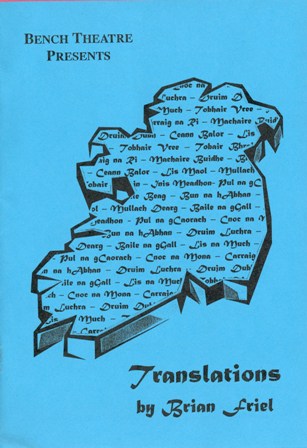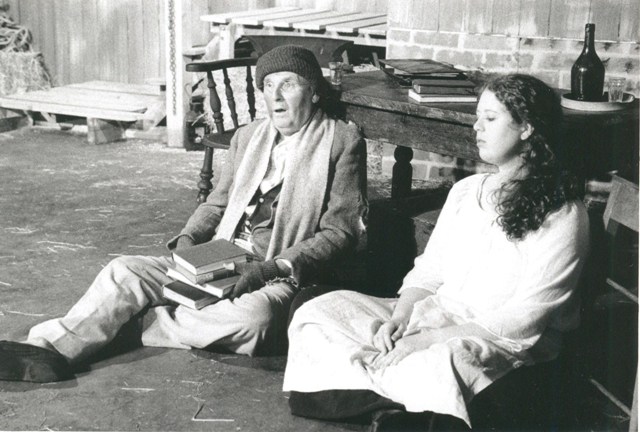Translations
Written by Brian Friel
Tuesday 25th July to Saturday 29th July 2000
Directed by Sam Emery
This beautiful and emotive play is set in late August 1833 at a hedge school in the town of Baile Beag, an Irish-speaking community in the county of Donegal, In a nearby field camps a recently arrived detachment of the Royal Engineers. Making the first Ordnance Survey. For the purposes of cartography, the local Gaelic place names have to be recorded and changed into English. Friel's powerful, moving and often humorous writing shows the devastating effect of this administrative operation on the lives of a small group of ordinary people.
previous
production
next
production
Brian Friel
Friel was born in Omagh, County Tyrone. Educated in Derry, he worked as a teacher and councillor. His first radio plays were produced in 1958: 'A Sort of Freedom' and 'To This Hard House'. These were followed by 'A Doubtful Paradise', his first stage play. Friel began writing short stories for The New Yorker in 1959 and shortly afterwards, he took leave from his full-time job in 1960 to pursue a career as writer
During the early 60s he wrote 59 articles for The Irish Press and found his first success as a playwright in 1964 with 'Philadelphia Here I Come!'. 'The Loves of Cass McGuire' and 'Lovers' followed in the next 3 years and during the remainder of the 1960s and the 1970's Friel produced further works including 'The Freedom of The City', 'Volunteers', 'Living Quarters' and 'Faith Healer'.
One of his more successful plays is 'Translations' which he wrote in 1980. However that decade is marked for him by a dearth of writing. It seems the conflict for his time as Director of the Field Day Theatre Company meant little time for writing. However, following his resignation from that post he was able to rise to prominence again with plays such as 'Dancing at Lughnasa' which was written in 1990 and which is probably his most widely performed and successful play.
An intensely private man, Friel rarely gives interviews or information about his private life. He was elected to the Aosdana in 2006 (being one of only seven living members allowed to hold that post at any one time) and in 2009, The Queen's University of Belfast built a new theatre complex and research centre named after him.
Translations was written in 1980 and first performed at the Guildhall in Derry that same year. The action takes place in a hedge-school in Friel's fictional town of Baile Beag/Ballybeg, an Irish-speaking community in County Donegal, in 1833. This date is significant for many reasons. The English army were at that time making the first ordnance survey map of Ireland; the new national schools were being established - to impose English as the national language; and the potato crop was about to fail drastically.
The action begins with Owen, younger son of the schoolmaster Hugh and brother to Manus, returning home after six years away in Dublin. With him are Captain Lancey, a middle-aged cartographer, and Lieutenant Yolland young and idealistic both working for the Ordnance Survey. Owen acts as a translator for the British and Irish. Yolland and Owen work to translate local place names into English and while Owen has no qualms about anglicising the names of places that form part of his heritage, Yolland, who has fallen in love with Ireland, is unhappy with what he perceives as a destruction of Irish culture and language.
A love triangle between the two brothers and a local woman, Maire, complicates matters. Yolland and Maire manage to show their feelings for each other despite the fact that Yolland speaks only English and Maire only Irish. Manus, however, had been hoping to marry Maire, and is infuriated by their blossoming relationship. When he finds out about a kiss between the two he sets out to attack Yolland, but in the end cannot bring himself to do it. When Yolland goes missing and Manus flees (because his heart has been broken) the British soldiers rampage across Baile Beag, threatening first to shoot all livestock then to evict and destroy the houses if Yolland is not found in twenty-four hours...
top of page

This play was staged at Havant Arts Centre, East Street Havant - Bench Theatre's home since 1977.
| Manus | Mark Wakeman |
| Sarah | Sue Dawes |
| Jimmy | John Scadding |
| Maire | Alice Corrigan |
| Doalty | David Hill |
| Bridget | Nicola Scadding |
| Hugh | David Penrose |
| Owen | Jim Flanagan |
| Lancey | Alan Welton |
| Yolland | Alex Cousins |
Crew
| Director | Sam Emery |
| Stage Manager | Zoë Corrigan |
| Assistant Stage Manager | Julia Jeram |
| Lighting Design | Damon Wakelin |
| Lighting Operation | Paul Millington |
| Sound Operation | Robin Hall |
| Publicity | Paul Davies |
| Leaflet Design | Pete Woodward |
| Set Design | Tim Taylor |
| Photographs | John Plimmer |
| Programme Editor | Derek Callam |
| Front of House | Ingrid Corrigan |
top of page
The NewsJames George
Sheer brilliance, you must go and see this
That Brian Friel is a master of language is demonstrated beyond doubt by this play. Words drop around us like rain. Images fall into our laps that both dazzle and betray. We are at once comforted and tortured in Greek, Latin, English, Gaelic.
Sam Emery's production for Bench Theatre lives up to Friel's promise in many ways, not least of which is a towering performance from company stalwart David Penrose as potion-swigging teacher Hugh. And while this cast has no weak links, mention must be made of two others in particular. Alice Corrigan and Alex Cousins play lovers, caught between Irish and English camps, with neither speaking the language of the other.
In the climax to act one, a scene brilliant both in its conception by Friel and its playing by these two, they communicate in the only words they share - the local Irish place names. As they come to understand one another, so do we. Sheer brilliance. And the final image of Corrigan clutching her lost love's book to her as she stares in to a future without hope, with the sound of Penrose's dark voice taking us deeper into the shadows is heart-breaking.
A must-see. The production runs until Saturday.
The News, 26th July 2000
top of page
Production Photographs

